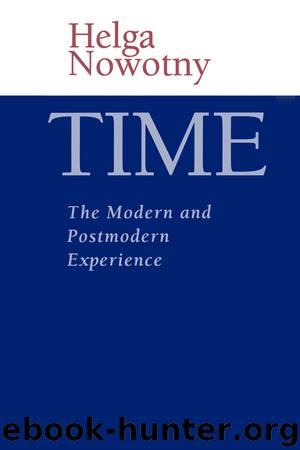Time by Helga Nowotny

Author:Helga Nowotny
Language: eng
Format: epub
Publisher: Wiley
Published: 2014-10-04T04:00:00+00:00
4
Politics of Time: The Distribution of Work and Time
… adults who have to be happy so that children can be happy. We need time for this. We need time for an everyday life without hustle and bustle. We need time for everyday culture. We need time for the chance to be a public person. And we need time for leisure. We do not need leisure time instead of a job, instead of a family, instead of politics. We need it as surplus time.
Christiane Müller-Wichmann, Zeitnot
Nowhere does the desire of individuals to have more time for themselves manifest itself as strongly and overwhelmingly as in that time unit which itself became its temporal reference point: in what is called everyday life. The change which this concept has undergone reflects the change in the quality of the perception of time which the latter has experienced in the extended present. Everyday life – this is no longer the merciless routine of a never-ending chain of toil and drudgery, relieved solely by the temporal contrast, the temporary release symbolized by the holiday, the Sunday.1 Everyday life has shed the stasis of an ahistorical permanence which was bestowed on it by a succession of history-making turbulences, focused on other – ‘Sunday’ – events, or which a Eurocentric approach had all too thoughtlessly ascribed to non-European societies. Everyday life is the successful rehabilitation of the time of ‘ordinary people’, who have long since become the majority, in advanced industrialized countries at least. Everyday life is the temporal dimension of the welfare state, in which it is institutions like those of social security that more or less effectively guarantee the temporal mastery of one’s life-history – through school, health service and national insurance, including old-age pensions – but in which the smaller temporal units, the transitions from yesterday to tomorrow, with all their joys and cares, their formal and informal relations, are to be coped with by people themselves. This everyday life has long since devoured the Sunday, which became the weekend, but the weekend can be individually deferred and fixed on another day.
In the extended present, the festivals, the truly extraordinary times, have also shrunk and are solely to be found as archaic residues. Even the carnival, that game of inversions and of liberation from old certainties, that escape from reality into an orgiastic recreation of the cosmos,2 now has to seek its moments in an extended present which can no longer afford to make longer periods completely free for games and tomfoolery, for a reversal of values and for disguises of all kinds. Everyday life still affords time for the so-called vicissitudes of life, but even here it is laid down how much time is to be expended on these: so many days off work in the case of a death; so many days off work for getting married; and so many for precisely defined vicissitudes of other kinds.3
Everyday life has become the bracket combining work and so-called free time; the private ‘spending’ of time and public spending form a new combination in everyday life.
Download
This site does not store any files on its server. We only index and link to content provided by other sites. Please contact the content providers to delete copyright contents if any and email us, we'll remove relevant links or contents immediately.
| Administration & Medicine Economics | Allied Health Professions |
| Basic Sciences | Dentistry |
| History | Medical Informatics |
| Medicine | Nursing |
| Pharmacology | Psychology |
| Research | Veterinary Medicine |
The Art of Thinking Clearly by Rolf Dobelli(10381)
The 5 Love Languages: The Secret to Love That Lasts by Gary Chapman(9761)
Mindhunter: Inside the FBI's Elite Serial Crime Unit by John E. Douglas & Mark Olshaker(9298)
Becoming Supernatural by Dr. Joe Dispenza(8186)
Nudge - Improving Decisions about Health, Wealth, and Happiness by Thaler Sunstein(7678)
The Road Less Traveled by M. Scott Peck(7574)
Mastermind: How to Think Like Sherlock Holmes by Maria Konnikova(7304)
Enlightenment Now: The Case for Reason, Science, Humanism, and Progress by Steven Pinker(7288)
Win Bigly by Scott Adams(7170)
The Way of Zen by Alan W. Watts(6575)
Factfulness: Ten Reasons We're Wrong About the World – and Why Things Are Better Than You Think by Hans Rosling(4723)
The State of Affairs by Esther Perel(4705)
Gerald's Game by Stephen King(4624)
Man's Search for Meaning by Viktor Frankl(4555)
The Confidence Code by Katty Kay(4237)
Thinking in Bets by Annie Duke(4204)
The Healing Self by Deepak Chopra(3558)
Hidden Persuasion: 33 psychological influence techniques in advertising by Marc Andrews & Matthijs van Leeuwen & Rick van Baaren(3536)
The Worm at the Core by Sheldon Solomon(3468)
